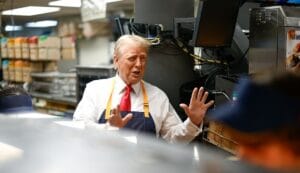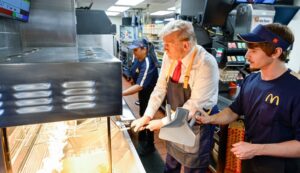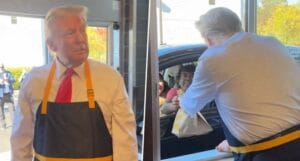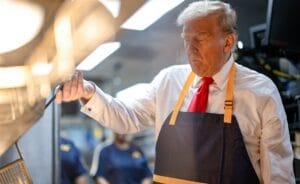In a move that stirred both curiosity and controversy, former President Donald Trump made headlines by visiting a McDonald’s in Feasterville, Pennsylvania, where he donned an employee apron and took orders from customers. This visit wasn’t just a fun outing; it was strategically aimed at challenging Vice President Kamala Harris’ claims about her past employment at the fast-food chain. With the election heating up, this encounter has significant implications for both candidates.
Trump’s Love for Fast Food
Let’s face it: Donald Trump and fast food are a match made in, well, America. Over the years, Trump has made no secret of his fondness for the Golden Arches. From famously enjoying Big Macs on his private jet to serving fast food at the White House for sports teams, his relationship with fast food is both entertaining and telling. It reflects a persona that many Americans find relatable, even if it’s a bit unconventional for a former president.
The Feasterville Visit
On a sunny Sunday, Trump landed at Philadelphia International Airport before making his way to a McDonald’s franchise in Feasterville. The buzz was palpable as supporters and curious onlookers gathered to see what the former president would do next. The choice of location wasn’t random; it was part of a larger narrative he was crafting around Harris’ claims.
Taking Orders and Cooking Fries
Once inside the bustling McDonald’s, Trump rolled up his sleeves and got to work, taking orders from customers in the drive-thru and helping cook fries. This was a scene that would make anyone stop and stare. The juxtaposition of a former president in a fast-food joint, interacting with everyday Americans, was something that captured the media’s attention and fired up social media.
Context of the Visit
So, why did Trump choose this moment? The visit directly correlated with ongoing questions about Kamala Harris’ summer job at McDonald’s, which she claims she held while studying at Howard University in 1983. Trump has been vocal about his doubts, stating that she “lied” about her experience. This wasn’t just idle gossip; it became a central talking point in their campaign battle.
Harris’ Summer Job at McDonald’s
Harris has often highlighted her time working at McDonald’s as a key part of her upbringing. For many, it symbolizes the hard work and determination that resonates with millions of Americans striving for a better life. Her narrative paints a picture of someone who understands the struggles of the middle class, a stark contrast to Trump’s more affluent background.
Trump’s Accusations Against Harris
Trump didn’t hold back during his recent speeches, especially in Detroit, where he doubled down on his claims regarding Harris’ employment history. His team has also jumped into the fray, with senior advisor Jason Miller suggesting that Trump’s visit was a way to showcase “what real work looks like.” This tactic is clearly aimed at undermining Harris’ credibility while bolstering Trump’s own image as a candidate connected to the average American.
The Campaign Dynamics
This incident is more than just a publicity stunt; it’s a tactical move in a heated election season. With both candidates vying for the hearts of undecided voters, these moments can significantly impact public perception. Trump’s actions reflect a calculated attempt to reclaim the narrative and question Harris’ authenticity.
Public Perception of McDonald’s
Let’s not underestimate the role of McDonald’s in American culture. The chain isn’t just a fast-food outlet; it’s a cultural icon that represents convenience, comfort, and, for many, their first job. In this political context, McDonald’s serves as a backdrop for discussions about work, identity, and socioeconomic status.
Also read: Trump Shocks Fans at Jets vs. Steelers NFL Showdown
Economic Implications
Moreover, McDonald’s is a significant player in the job market. With over 25,000 employees in Pennsylvania alone, the chain provides critical employment opportunities. Harris’ campaign has leveraged her McDonald’s experience to resonate with voters who value hard work and relatability—traits that are often overlooked in the high-stakes world of politics.
The Business Owner’s Perspective
Derek Giacomantonio, the owner of the McDonald’s location Trump visited, welcomed the attention. He emphasized the importance of showcasing the fast-food experience, saying it reflects a fundamental aspect of American life. For him, opening the doors to Trump was about more than politics; it was about celebrating the hardworking ethos that fast food represents.
Fast Food as a Gateway to Opportunity
As a former crew member, I can attest to the life lessons learned while working at McDonald’s. For many, it’s not just about flipping burgers; it’s a stepping stone to greater opportunities. The experience instills responsibility, teamwork, and resilience, qualities that resonate with voters who value the American Dream.
Also read: The Diplomat Season 2: Shocking Twists and Tense Drama
Conclusion
Donald Trump’s visit to McDonald’s has added a new layer to the ongoing political drama between him and Kamala Harris. This encounter illustrates the lengths candidates will go to connect with voters and shape their narratives. In a world where image and relatability can make or break a campaign, every moment counts. As the election draws closer, expect more surprising moments that blend politics with everyday life.
FAQs
1. Why did Trump visit McDonald’s in Pennsylvania?
Trump aimed to challenge Kamala Harris’ claims about her past employment at the chain while connecting with voters.
2. What did Harris say about her McDonald’s job?
Harris has mentioned working at McDonald’s during the summer of 1983, emphasizing it as part of her middle-class upbringing.
3. How did the public react to Trump’s McDonald’s visit?
Reactions varied, with some supporting his attempt to connect with everyday Americans, while others criticized the political motivations behind the visit.
4. What is the significance of McDonald’s in American culture?
McDonald’s represents more than fast food; it symbolizes opportunity, comfort, and the first job experience for many Americans.
5. How does this incident affect the election?
This moment highlights the campaign strategies of both candidates, emphasizing the importance of relatability and authenticity in a tightly contested race.




